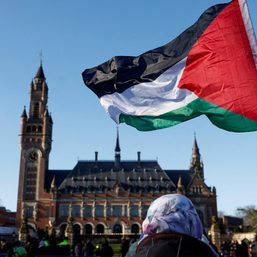SUMMARY
This is AI generated summarization, which may have errors. For context, always refer to the full article.

GAZA – Gaza medical chiefs are turning to volunteers to help run an emergency service buckling under Israel’s offensive as ambulances struggle to reach bomb sites past rubble-strewn roads and with ever-depleting supplies of fuel.
Medical and emergency staff have worked with little rest and are deploying in the most dangerous areas, witnessing the horror of violent death, terrible injuries and grief.
Gaza’s health ministry has called on all trained paramedics to help staff hospitals and call-out teams, but though dozens have responded the system is still in dire need of more workers, it said.
“I have not gone home since the first day of the war. I shower here, sleep here and eat here,” said Loay al-Astal, a volunteer emergency worker in Khan Younis, in the south of the enclave.
Health authorities in the Hamas-run enclave say Israeli air and artillery strikes have killed more than 8,000 people since October 7 when Hamas fighters rampaged through security barriers to kill more than 1,400 Israelis and take more than 200 hostage.
After Israel began ground operations on Friday, October 27, many Gaza residents fear the destruction will intensify.
Israel has ordered civilians to leave the northern half of the Gaza Strip for the south, but has continued an intense bombardment across the enclave and many people are refusing to leave.
Shelling on Gaza’s main north-south road on Monday, October 30, meant the enclave was all but cut in two, with any attempts to flee south risking bombardment.
The health ministry said 116 medical staff had been killed in the bombardment since October 7, along with 18 civil emergency department rescuers.
Astal, the volunteer who had trained at university to be a paramedic but was unemployed when the war began, described an incident in which some of his colleagues had nearly been killed by an air strike that blew out the windows of their ambulance.
“The glass was smashed and some of our volunteers were wounded,” he said.
He is haunted by the memory of trying to save a woman who was buried up to her neck in rubble from an air strike. “There was a cut on her head and I rushed to treat the wound,” Astal, 33, said.
She asked him to free her from the rubble so she could find her son, but she died minutes later, still trapped, he said. “I felt bad I couldn’t save her,” he said.
‘Where should we go?’
The head of the Khan Younis ambulance service, Naseem Hassan, said the department was overwhelmed and needed trained medics. “We opened the door for volunteers and many young people answered that call and have been on duty since the war began,” he said.
Along with the bombardment, Israel has imposed a blockade on the enclave, home to 2.3 million people, cutting supplies of electricity and fuel. Limited food and medical aid deliveries have entered Gaza since last week after international pressure on Israel.
“Ambulances are about to go out of operation because we have very limited fuel left. We have problems with communications. We lose touch with the ambulances that leave here,” said volunteer driver Sari al-Najjar.
Phone and internet services in Gaza were cut off for nearly two days over the weekend as Israeli tanks started moving into the enclave. Communications gradually started returning from Sunday, October 29.
Without reliable power supplies, many residents were unable to charge phones, adding to the difficulties for ambulance crews trying to locate and coordinate rescues.
Thousands of people have gathered at hospitals in Gaza City, in the north of the enclave, many sheltering in makeshift tents hoping for some safety from the bombardment.
Medical officials said air strikes in the vicinity of the major Gaza City hospitals including al-Shifa, al-Quds and the Turkish Friendship hospital, have caused damage.
Israel has accused Hamas of placing command centers and weaponry near hospitals, which the group denies.
“Where should we go? It is all one death,” said Hatem Sultan, sheltering near al-Shifa Hospital, the enclave’s biggest medical center, where ambulances were constantly arriving with people injured in air strikes. – Rappler.com
Add a comment
How does this make you feel?









There are no comments yet. Add your comment to start the conversation.